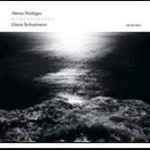
Romanzen
 $40.00
Out of Stock
$40.00
Out of Stock6+ weeks add to cart
SCHUMANN / HOLLIGER
Romanzen
Christop Richter (cello), Denes Varjon (piano), Heinz Holliger (oboe)
[ ECM Records / CD ]
Release Date: Saturday 1 August 2009
This item is currently out of stock. It may take 6 or more weeks to obtain from when you place your order as this is a specialist product.
"It's an inquisitive piece in which cello and piano step tentaively around each other with the subtlety of the opening sections giving way to the hysterical intensity of "RS Flügelschlagen", in which the piano is attacked internally and cello plucked violently, before spiralling into silence." The Independent
" It makes an immensely powerful, multilayered work, full of dense orchestral writing and highly wrought climaxes. The cello-and-piano pieces expand the soundworlds of the two instruments to create an extraordinary friction between Schumann's and Holliger's musical realms." The Guardian, 5th June 2009 ****
"It's an inquisitive piece in which cello and piano step tentaively around each other with the subtlety of the opening sections giving way to the hysterical intensity of "RS Flügelschlagen", in which the piano is attacked internally and cello plucked violently, before spiralling into silence." The Independent, 29th May 2009 ***
Two important pieces by Swiss composer Heinz Holliger, who celebrates his 70th birthday on 21 May, both inspired by Robert Schumann, are combined with a chamber work by Clara Schumann.
A fascinating concept album circling around the fragility of artistic sensibilities in German musical and literary romanticism. Two important pieces by Swiss composer Heinz Holliger, who celebrates his 70th birthday on 21 May, both of them inspired by Robert Schumann, are combined with a chamber work by Clara Schumann. They all intersect in the year 1853, when 20-year-old Johannes Brahms first visited the Schumann couple in Düsseldorf. The initial piece, Clara's three wonderfully melodic Romances for cello and piano, is followed by Holliger's imaginative and multi-faceted homage to Robert's "Romances" in the same scoring. Much to Brahms' approbation they were burnt by Clara in 1893 as she feared her late husband's reputation could suffer if compositions from the onset of his mental illness would be publicised. All that survives is a vivid description by violinist Joseph Joachim. Holliger takes this verbal account as a starting point for music that subtly meditates upon the double character of love and death, music and silence, romances and cinders. "Gesänge der Frühe" first performed in 1988 is scored for choir, orchestra and tape. Schumann's last piano work of the same title from 1853 is superimposed in a most visionary way with texts from the late period of Friedrich Hölderlin - another romantic genius who fell prey to mental illness.
Tracks:
Holliger:
Romancendres for cello & piano
Gesänge der Frühe
Schumann, C:
Three Romances Op. 22
for cello & piano
